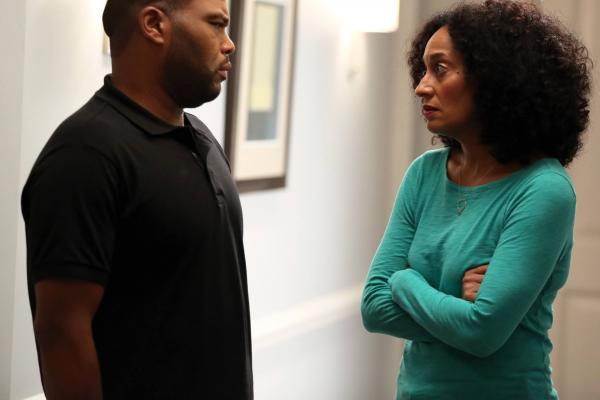Black-ish, the new ABC sitcom created by Kenya Barris, really is one of the funniest shows on TV this season. I laughed my head off watching a marathon run of the first four episodes On Demand. Now it's set to record each week on DVR. One of the things I really appreciate about Black-ish is that it takes universal issues and works them out through a genuinely African-American lens.
For example, in the pilot episode the father, Andre “Dre” Johnson, played by Anthony Anderson, is looking forward to a much deserved promotion to Senior VP at a major marketing firm. He is surprised to find out he’s been promoted to Senior VP of the Urban Division. We can all relate to wanting the promotion, but Anderson’s challenge is one particularly familiar within the black professional class. How do you jump the dreaded, yet anticipated, pigeonholing of your value and worth to an organization as a “black” person? How do you become just Senior VP — not SVP of the “Urban” Division? How do you become human? The way Anderson works out this challenge is hilarious. I rolled with laughter even after the half-hour sitcom had reached its conclusion.
And then there’s last week’s episode when the biracial mother, Rainbow, masterfully played by Tracee Ellis Ross, loses her young son, Jack, while shopping at a department store. It turns out Jack is hiding inside a clothes rack and is eventually found by a sympathetic officer. We can all relate to this situation. Children hide in department stores. I did the exact same thing to my own mother when I was about Jack’s age. I hid between the racks at a Marshalls. But Rainbow and Dre’s conundrum rears its head when they are confronted with the question: Will they spank their son? It seems simple enough, but it’s not. This is not only a question of parenting, it is also a question of tradition and culture.
In fact, each episode presents a universal situation that pushes a particular issue of culture within the African-American community. Ultimately, the situation presses the question: “What does it means to be black?”
Black-ish doesn't serve up the images and situations familiar to black poverty — images that American consumers crave. Rather, Barris, uncovers the truth of a class of black families barred from mass media since The Cosby Show. When the The Cosby Show went down, up came the flood of black buffoons — cartoon caricatures playing stock characters from minstrel shows and "couch" dramas. (BTW, I call them "couch" dramas because the set is always anchored by a beat up couch facing full front, center-stage. Think: Tyler Perry.)
Then, of course, there is the multi-billion dollar market for images, stories, and music that glorifies the black gangsta. Can I just say: It was a very strange day when I realized my white and Asian Christian friends knew the names and music of black rappers way more than I did? That freaked me out. Why? Because, I had bought the lie. To be black is to be gangsta — or at least an expert on the latest gangsta hip-hop album, usually produced by a white company and sung by a black man who owns a few mansions in the "Hills" somewhere.
Black-ish is a departure from buffoonery and gangstas, unless it consciously takes a dig at the stereotypes. It is a much needed peek at African-American humanity. These are the conversations we have around the dinner table at night. When poverty is removed from the equation, these are the human and cultural concerns that rise to the surface in our families.
People weren’t sure Black-ish could reach a wide audience, but the pilot episode won its Wednesday night timeslot with more than 11 million viewers.
They say humor is funny when it strikes the audience as "true." One of the main critiques of The Cosby Show when it first aired was that it wasn't realistic. But my family, with two highly respected professional parents and a gaggle of high achieving kids, sat down every Thursday night back in the 1980s and laughed ourselves silly because in many ways the Cosby family was our family. The Cosby Show became one of the most popular shows of all time. Because it was so specific, it reflected the humanity of us all.
At this moment in our nation’s story when the twisted soul of America is being revealed through the daily deaths of black men at the hands of officers carrying guns and unconscious bias, Black-ish should not be consumed: It should be administered by intravenous intervention.
If Trayvon Martin, John Crawford III, Ezell Ford, Eric Garner, Jordan Davis, and Michael Brown tell us nothing else, we could learn from these unarmed middle-class black men that America needs to reimagine blackness — to reimagine what it means to be human.
Lisa Sharon Harper is Senior Director of Mobilizing for Sojourners and co-author of Forgive Us: Confessions of a Compromised Faith.
Got something to say about what you're reading? We value your feedback!
